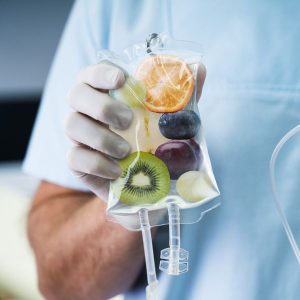What is Gluten?
Gluten is a protein composite (combination of Prolamines & Glutelins) that is added to certain grains.

Food & Gluten Sensitivities

Why The Rise of Gluten Intolerance?
- Gluten is used as an additive to foods that otherwise lack nutrition
- Has been recently introduced as an additive for
- Texture
- Elasticity
- Binding & filling
- Our bodies are not used to processing high quantities of gluten
- Testing is much more predominant today to determine sensitivities
Gluten Intolerance Symptoms
More and more patients are complaining of common symptoms related to Gluten sensitivity
GI ISSUES
- BLOATING
- GAS
- ABDOMINAL CRAMPS
- DIARRHEA
- ACID REFLUX/HEARTBURN
- IRREGULAR BOWEL MOVEMENTS
SKIN ISSUES
- ECZEMA
- PSORIASIS
- HIVES
- RASHES
RESPIRATORY ISSUES
- COUGHING
- ASTHMA
- BRONCHITIS
ACUTE SYMPTOMS OF FOOD INTOLERANCE
- SNEEZING
- DIARRHEA
- VOMITING
- ITCHING/BURNING/ SWELLING OF THE SKIN
Gluten Intolerance Is not a disease but it creates inflammation, causing diseases

Gluten Intolerance Is not a disease but it can be associated with disease

Gluten Intolerance
Countless patients are taking unnecessary RX due to misdiagnoses.
This creates:
- More inflammation
- An environment prone to disease
- Nutritional status to become compromised
- A shift in the balance of the body.
3 GROUPINGS OF GLUTEN INTOLERANCE
- Celiac Disease — Autoimmune disease that typically is aggravated by gluten
- Non-Celiac Gluten Sensitivity — Unable to tolerate gluten.
- Wheat Allergies — Food allergy that causes complications in people who are sensitive to gluten
Common Misdiagnoses of Gluten Intolerance
- Irritable Bowel Syndrome
- Ulcerative Colitis
- Colitis
- Reflux
- Crohn’s Disease
- Celiac Disease
Gluten VS. Celiac
Recent studies are showing the gluten sensitivity may be much more common than previously thought. It may, in fact, be a separate disease entity that involves different organs and different mechanisms than celiac disease. While there is no doubt that the condition exists, the lack of definite criteria for a diagnosis has resulted in a skeptical attitude on the part of many doctors.” He continues: “The acceptance of gluten sensitivity as a valid condition has evolved.
*source : Dr. Peter Green – Director of The Celiac Disease Center at Columbia University
- 60-70% of those who believe they have celiac disease are actually gluten sensitive – they do not have celiac disease.*
*source : *Dr. Alessio Fasano –University of Maryland Celiac Research Center
- Gluten sensitivity is still present in the absence of Celiac Disease (when tests may be negative) according to a double blind randomized placebo study published in the American Journal of Gastroenterology. *
*source : Am J Gastroenterol, Jan 11, 2011
- Celiac Disease is most commonly suspected instead of gluten sensitivity.
- Celiac & gluten sensitivity are NOT the same but often symptoms mimic each other
- Celiac is a disease… gluten sensitivity causes disease. Only way to determine is testing
Gluten Testing Options
HLA-DQ
- Most accurate available — Buccal Swab
- Still being perfected
- Tests for positive genes for gluten sensitivity and Celia Disease
Blood Testing
- IgE
- IgG
Stool Testing
- Fairly accurate
- Limited to gliadin
Stool Biopsy
- Only tests for Celiac Disease, not gluten intolerance
Appropriate Gluten — Free Diet
Healthy Eating Program
- Balanced diet with a customized meal plan
- Eat 5-6 times per day
- Eliminate foods containing gluten
- Medical grade supplements & enzymes
Hidden Sources of Gluten
- Cereal
- Candy
- Cold cuts
- Canned soups
- Chocolate
- Sour cream
- Dry roasted nuts
- Frozen products
- Toothpaste
- Envelope seal
- Stamp glue
- Lip balm
- Lipstick
AVOID: Processed foods, Malt, Wheat, Gluten, Rye, Oats, Barley
Combining Diet & Enzymes
- Diet alone isn’t always the whole answer
- Diet removes items from the body, but doesn’t heal the gut
- Enzymes help to heal the gut
- Enzymes reduce inflammation in the gut
CELLULAR NUTRITIONAL SUPPORT & DIGESTIVE ENZYMES
Role of Supplements & Enzymes
- Gluten intolerance can cause poor absorption of nutrients
- Test with an Intracellular panel to determine deficiencies
- Replace with healthy balanced diet & medical grade supplements
- Benefits of supplementing with digestive enzymes
- Healthy & optimally functioning digestive system
- Greater bio-availability of nutrients to boost immunity
- Enhanced removal of harmful toxins
- Replace Probiotics
- Replace Protease
- Replace Digestive Enzymes
- Polysaccharides (in case some Gluten gets in)


















